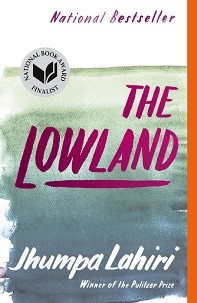My first encounter with Jhumpa Lahiri was through a college book program that encouraged all first-year students to read The Namesake, a book about forging an identity when one becomes lost amid the ebb and flow of social expectation. That novel, a perfect read for freshman students, was an odd choice for me, an orientation leader and a third-year who felt entirely knowledgeable about the conceptualization of my personhood. But sitting with fresh-faced women who were eager to define themselves in a way that the terrors of high school had not made me realize that the novel broadened not only the way I understood myself (and in fact, that I wasn’t sure of myself at all) but also the way I saw myself in relation to those around me. It was the first time Jhumpa Lahiri impressed me, but it wouldn’t be the last.
Her most recent novel, The Lowland, is an exceptional tale that spans the life of two young brothers, Subhash and Udayan Mitra, who grow up in a small village near Calcutta. Born fifteen months apart, the two brothers act more like twins: they are inseparable, playing together from the minute they wake up and lying down next to each other at night. Their appreciation for one another is beautiful, it projects the image of a perfect childhood, not filled with wealth and travel, but with the ease of companionship, a total lack of loneliness.
After they complete high school, the brothers enter separate universities. Udayan becomes fascinated by the idea of joining a communist party for India; he is enchanted by the movement in China, and by the great leader, Mao. During the 1960s, Udayan observes the beginnings of a rebellion to diminish Indian poverty and create a better life for his people, his family and friends. He is entranced by the idea of self-determined liberty and begins plotting his own personal activism, eventually joining the new wave of political action.
Of an entirely different mindset, Subhash simply wants peace and prosperity. He enjoys the exploration and discovery that comes from the study of academia. Uneasy at the idea of Udayan’s violent political tendencies, Subhash grows apart from his brother. Eventually he leaves India for a graduate program in the United States. He moves to Rhode Island, a place completely different from home, and learns to live away from his family.
It is after Subhash’s move that the book begins to spin a new kind of tale. Gone from their lives is the feeling of safety in silent communication, instead, the men communicate only by letter and their words never convey their personal sentiments about the political uprising in India. As a reader, I was frustrated by the brothers: for so long they knew nothing else but each other, so why was it that when life got in the way, neither sought help from their most trusted safety source, each other?
At Brown University, it becomes clear that Subhash is too far removed from his family back home. He learns that Udayan has married and subsequently that he has been killed. Subhash, the rational, reasonable brother feels as though his world is crashing down. He returns to India after Udayan’s death, to meet and marry his brother’s wife, taking care of the things that Udayan has left behind. Deciding to return back to the United States, Subhash brings his new wife with him to take on a new life there, together.
But Gauri, the fiery, beautiful woman whom Udayan left behind, is not satisfied by Subhash. He is not his brother and their lives will never be as fulfilling as her activist life with Udayan, she thinks. Unhappy, the two forge ahead, learning to pave different paths, side-by-side but never together, never as true companions.
While tragedy is an underlying theme throughout the novel, Lahiri’s beautiful prose creates a riveting story full of characters you come to love and sympathize with. It is a story about reflection and forgiveness, about growth and knowledge. The Lowland teaches the reader that even as time passes, grief does not disappear but simply numbs the consciousness, forging a new way of living.
The Lowland proved to be one of the best books I had picked up in a while. It unsettled, even rattled me, but then exposed me to a peaceful sense of understanding and appreciation for my own, tempestuous life. I was always eager to pick it back up again; it was a story that did not fade from my mind or memory. Subhash and Gauri’s story is wracked with sadness but filled with hope; a relatable, emotional experience. As with The Namesake, Lahiri manages to find concepts that can appeal and apply to anyone, and both novels will change your sense of self—guaranteed.







